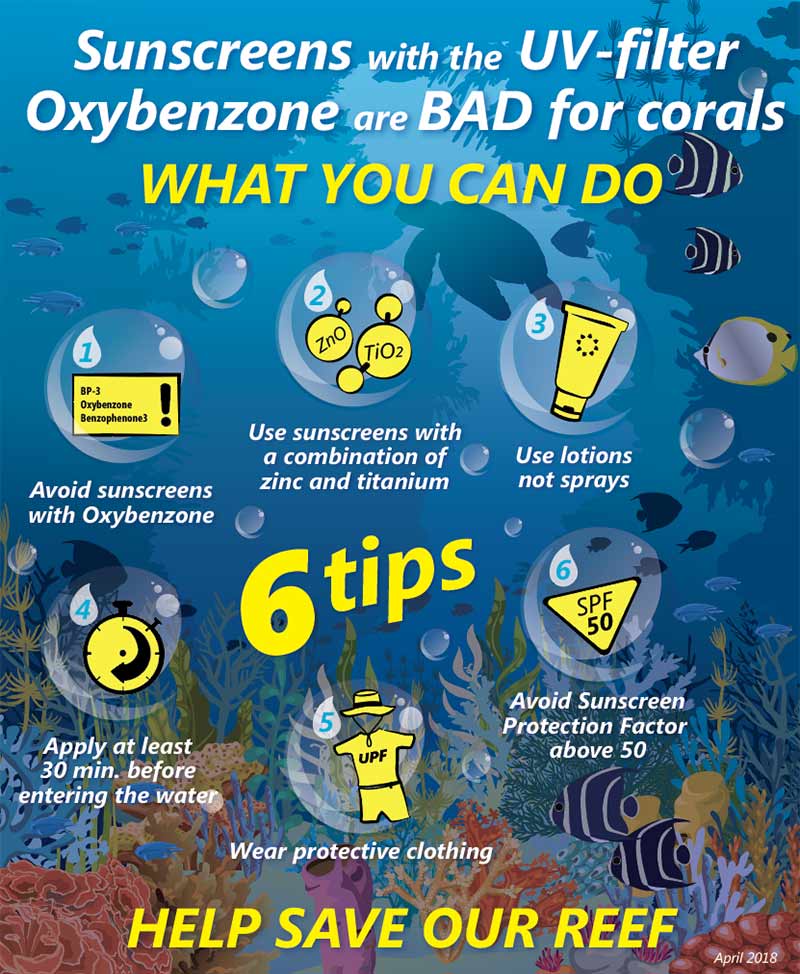With a plethora of outdoor activities on this long holiday weekend on Bonaire, be sure you choose and use the right sunscreen to keep our reefs safe!
As more and more research is being conducted, there is a clear indication that using sunscreens which have Oxybenzone as an active ingredient are harming coral reefs! When visiting Bonaire, we encourage everyone to choose their sun protection wisely, but many people do not know exactly what to look for in an environmentally friendly sunscreen. Here are six of the best tips to ensure your sunscreen is healthy for Bonaire’s reefs, as well as yourself!
Is Sunscreen a threat to Bonaire’s reefs?
It’s helpful to understand why the chemical sunscreen issue is becoming a hot topic. Scientists have been researching the harmful effects of sunscreen on corals for more than a decade. The most leading scientist in this area of research is Dr. Craig Downs, Executive Director, Haereticus Environmental Laboratory (HEL), Virginia USA, who has focused his scientific research on Oxybenzone; a UV filter used in many sunscreens. Craig Downs’ research has led to a dedicated community movement on Hawaii that has been raising awareness and that has also been advocating legislation to ban sunscreens with oxybenzone on Hawaii.
The threats that sunscreens containing Oxybenzone form to our reefs on Bonaire are very complex, but the solution can be quite simple.
The reality of today is that our reefs face many threats, such as climate change and the subsequent increase in water temperatures, and water pollution through sewage and sedimentation. In most cases, global environmental issues need global solutions. However, water pollution by sunscreens with Oxybenzone is a global issue that can actually be solved locally. According to Dutch scientist Diana Slijkerman of Wageningen Marine Research, getting rid of harmful sunscreens on Bonaire is “totally do-able.”
The effects of Oxybenzone
The UV filter Oxybenzone impacts the coral in various ways, thereby affecting the coral’s natural integrity to withstand other pressures such as climate change as it:
In laymen terms, this means that sunscreens containing Oxybenzone cause irreversible damage to corals in general, but are specifically life-threatening to juvenile corals.
Research of harmful effects sunscreen on Bonaire
Recent studies were done by Dr. Diana Slijkerman (Wageningen Marine Research) also showed that Oxybenzone can be found on Bonaire. She studied the potential risks of Oxybenzone and three other UV-filters and has specifically looked at the concentrations in Sorobon, the nearby mangroves, and Lac Cai, and she estimated the risk of the actual concentrations towards the nursery areas in the surroundings.
Contrary to three years ago, Bonaire now receives cruise ships all year round. Cruise ship tourists visit Sorobon with increasing frequency, resulting in a large increase in sunbathers. Consequently, these sunbathers increase the risk of sunscreen with potentially damaging UV filters ending up in the water of the Lac Bay area. The risk assessment performed shows that the environmental risk and potential effects resulting from this emerging pollution cannot be denied, especially in the scope of increasing tourism. Dr. Slijkerman concludes that it would be wise to take precautionary measures to prevent future environmental effects.
What can we do to preserve our reefs on Bonaire?
Bonaire is not the first to acknowledge the harmful effects of Oxybenzone in sunscreen products and hopefully not the last. Hawaii has paved the way for Bonaire, and we can learn from the steps that they have taken to educate tourists and inhabitants. There are simple steps you can take to make a difference and safeguard coral reefs on Bonaire:
Do not use sunscreens with Oxybenzone.
Inform yourself and read the ingredient list; look for Oxybenzone, also known as benzophenone3 (or BP-3). Note: Manufacturers can make false claims, promoting their sunscreens as reef safe products. If sunscreens do contain Oxybenzone they are NOT reef friendly!
Do use sunscreens with mineral barriers!
Those with active ingredients of either zinc or titanium oxide or a combination of the two are good to use. Read the label! Just check the active ingredients on the label. If you see anything else, it’s probably not recommended for use.
Use lotions over spray cans.
Aerosol spreads sunscreen much further so that it is able to form a film (thin layer) on the water surface.
Apply sunscreen at least 30 minutes before entering the water.
By doing so, the sunscreen has time to adhere to the skin, which decreases the wash-off factor when entering the water.
Wear protective clothing instead.
Long-sleeved rash guards protect against the sun. Clothes have their own UV protection rating, called UPF. Synthetic fabrics have a higher UPF than cotton fabric, especially when wet.
Avoid SPF above 50.
(SPF 50 blocks 98% of UV rays, SPF 100 blocks 99%) SPF 30 to SPF 50 should provide adequate protection when used correctly. Sunscreens with higher SPF contain many more chemicals than lower SPF, but only offer a minimal increase in UV-protection.
Next steps for Bonaire
Boneiru Duradero and Wageningen Marine Research, with the support of the World Wildlife Fund for Nature in the Netherlands, just recently completed a seminar on Bonaire about the harmful effects of sunscreens containing Oxybenzone. Lead speakers at this event were Dr. Craig Downs (HEL) and Dr. Diana Slijkerman (WUR), who shared their scientific research with participants.
The first mission coming from this seminar is to create an island-wide awareness about the possible threats to our reefs, caused by sunscreens with Oxybenzone. The second goal is to unite all resellers of sunscreen products on Bonaire with the common goal to only sell sunscreens that are FREE of Oxybenzone. The hope is that this initiative will be carried forward to other islands in the region.
A consortium of nature organizations, dive facilities, and retail stores are already on board and only sell sunscreen products that do not contain Oxybenzone. If you are planning to visit Bonaire, do read the label of your sunscreen product, and if it lists anything other than zinc or titanium oxide as the active ingredients, then ditch it and purchase your sunscreen protection on the island.
(Source: Boneiru Duradero)








